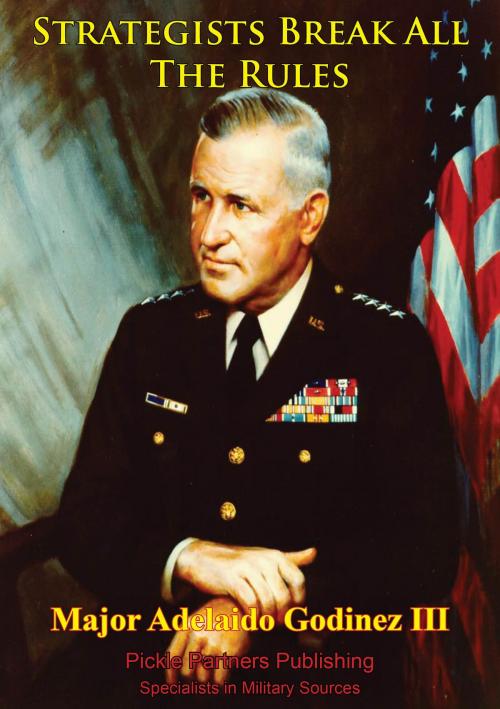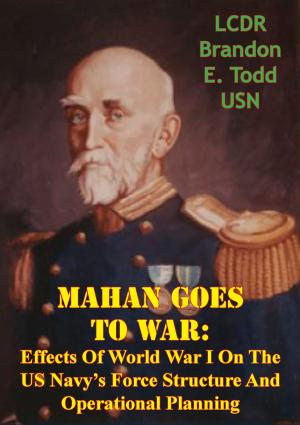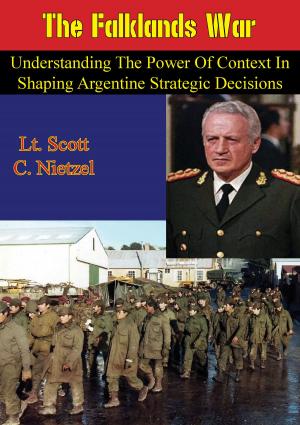| Author: | Major Adelaido Godinez III | ISBN: | 9781782894391 |
| Publisher: | Tannenberg Publishing | Publication: | August 15, 2014 |
| Imprint: | Tannenberg Publishing | Language: | English |
| Author: | Major Adelaido Godinez III |
| ISBN: | 9781782894391 |
| Publisher: | Tannenberg Publishing |
| Publication: | August 15, 2014 |
| Imprint: | Tannenberg Publishing |
| Language: | English |
Emory Upton believed that politicians should leave war to professionals. This led to two assumptions that became conventional wisdom: first, an apolitical army represented a more professional force; and second, the problems at the tactical and operational level were similar enough to be useful in developing strategic thinking. These assumptions resulted in what Samuel P. Huntington described as the "normal-theory" relationship between policy-makers and generals. The assumption made sense for the United States but had one unfortunate result. The Army as an institution misread the nature of an apolitical force. The essence of an apolitical force should be non-partisan -Army professionals above political interference or interest. There is a difference, however, between policy and politics. While not involving itself in the political life of the nation, the Army is vitally concerned with the policies of the nation. The discussion strategists must prepare for are political, but in the nature of policy as the object of war. A historical survey of strategists from General Winfield Scott to General Creighton Abrams suggests that the most successful strategists are life-long learners. They build holistic understanding of the interdependent and infinite connections of the whole problem. Once they develop a hypothesis about the whole problem, they reshape those connections to create a better peace for the United States. Strategists that take time to understand the whole problem encourage discourse. Retaining the Functional Area 59 Strategist program will continue to benefit the force because they do not follow a traditional route to generalship. After all, few have earned stars by arguing, debating, and taking intellectual risk.
Emory Upton believed that politicians should leave war to professionals. This led to two assumptions that became conventional wisdom: first, an apolitical army represented a more professional force; and second, the problems at the tactical and operational level were similar enough to be useful in developing strategic thinking. These assumptions resulted in what Samuel P. Huntington described as the "normal-theory" relationship between policy-makers and generals. The assumption made sense for the United States but had one unfortunate result. The Army as an institution misread the nature of an apolitical force. The essence of an apolitical force should be non-partisan -Army professionals above political interference or interest. There is a difference, however, between policy and politics. While not involving itself in the political life of the nation, the Army is vitally concerned with the policies of the nation. The discussion strategists must prepare for are political, but in the nature of policy as the object of war. A historical survey of strategists from General Winfield Scott to General Creighton Abrams suggests that the most successful strategists are life-long learners. They build holistic understanding of the interdependent and infinite connections of the whole problem. Once they develop a hypothesis about the whole problem, they reshape those connections to create a better peace for the United States. Strategists that take time to understand the whole problem encourage discourse. Retaining the Functional Area 59 Strategist program will continue to benefit the force because they do not follow a traditional route to generalship. After all, few have earned stars by arguing, debating, and taking intellectual risk.





![Cover of the book Operation Thursday: Birth Of The Air Commandos [Illustrated Edition] by Major Adelaido Godinez III](https://www.kuoky.com/images/2015/november/300x300/9781786252494-RzRY_300x.jpg)
![Cover of the book Hitting Home - The Air Offensive Against Japan [Illustrated Edition] by Major Adelaido Godinez III](https://www.kuoky.com/images/2015/november/300x300/9781786252432-Mh6l_300x.jpg)








